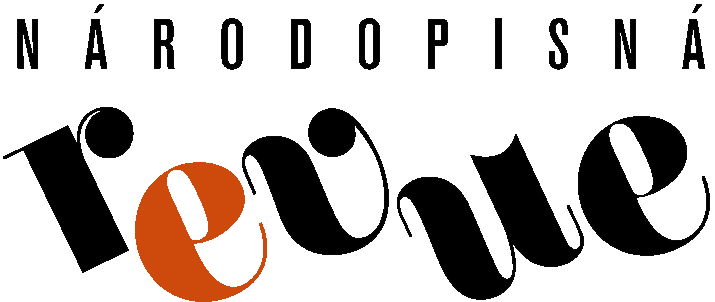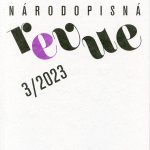Studies on the Subject of “Transformation of Popular Culture”
Dammed, or Adored Music? Reception of Pop-Folk Music in Czech-Austrian Cultural Contacts in the Early 1990s (Ondřej Daniel)
“Sunny Grave” and “Odyssey”: Restrictions and the Creative Process in Socialist Czechoslovakia Using the Cases of the Blue Effect and Atlantis Bands (Oldřich Poděbradský)
Satanic Elements in Czech Black Metal: Subcultural Style and Identity (Miroslav Vrzal)
Slavic Pop(Culture)? Introduction to the Issue, Using an Example of Poland (Gabriela Maria Gańczarczyk)
To the History of the First Comprehensive Ethnographic Expeditions in Ukraine (Iryna Dovhaljuk)
For all content click the button CONTENTS.
Dammed, or Adored Music? Reception of Pop-Folk Music in Czech-Austrian Cultural Contacts in the Early 1990s
Ondřej Daniel
The primary objective of this article is cultural-historical interpretation of the social impact of the production of musical genres on the borderline between folk and popular music. The investigation aims to illuminate the reception and cultural significance of these musical hybrids in the Czech context, with a particular focus on their cross-border interaction with Austria. The study examines intersections of age, socioeconomic status, ethnicity and gender, associated with the preferences for musical genres on the borderline between folk and popular music in Austria and the Czech lands in the 1990s, meaning a period characterized by an abrupt and intensified integration of global cultural influences. Relying predominantly on empirical evidence and the current state of expert knowledge, the research identifies several contextual and model roles in which this music may have served as a divisive or unifying factor. The identification of the intersections between the consumption, production and circulation of pop-folk music is discussed here in three aspects: age, class, and geography.
“Sunny Grave” and “Odyssey”: Restrictions and the Creative Process in Socialist Czechoslovakia Using the Cases of the Blue Effect and Atlantis Bands
Oldřich Poděbradský
This article focuses on the state-forced changes in the musical creative process in 1960s communist Czechoslovakia. Using historical sources and narrative interviews with famous musicians of that time (Karel Kahovec, Viktor Sodoma, Josef Laufer…), it examines how musicians perceived the effects of state repression e.g. having to translate English lyrics into Czech, being persecuted for playing a specific musical genre, and being banned from the media due to inappropriate themes or topics used on their records. These repressions are evidenced in two example cases: the song “Slunečný hrob” [Sunny Grave] by the Blue Effect band, which became famous in the Czech movie Pelíšky only in the late 1990s, and the unjustly forgotten album Odyssea [Odyssey] recorded by Atlantis, a Petr Ulrych’s music band, in 1969. The article shows how the perception of music and lyrics by the state’s repressive apparatus changed over a short period of time and how artists negotiated with the regime according to the changing circumstances.
Satanic Elements in Czech Black Metal: Subcultural Style and Identity
Miroslav Vrzal
The article focuses on satanic elements within the subcultural style of black metal. The text is based on own long-term qualitative research, in particular the analysis of interviews with Czech black metallers aged 21–33, supplemented by ethnographic findings from 2010 to the present. The study shows the function of satanic elements both as a source of resistance through style to what is perceived by the participants as mainstream, and also their connection with the formation of anti-Christian ideology, which must also include an anti-social and anti-cultural aspect. From the point of view of the use of satanic elements, the participants particularly emphasized the period of adolescence, when for them, within their own image, satanic elements played an important role as a subcultural code communicated to the surrounding society. At the same time, Satanic elements played a role in shaping the participants’ own religiosity, specifically Satanic identities.
Slavic Pop(Culture)? Introduction to the Issue, Using an Example of Poland
Gabriela Maria Gańczarczyk
The Slavic world in present-day Poland is a remarkable conglomerate of post-Romantic interest in the roots of their own culture, profit-aimed marketing and several other factors one of them being Russian political influences. Slavic motifs have appeared in Polish culture, and not only the folk one, at least since the era of Romanticism. However, only in the last decade we can speak about a very wide range of Polish popular culture’s fields referring to Slavicism. These include diverse literature, plays of all kinds, film and TV production, music, fashion, and physical exercise. The article maps particular areas of this part of Polish popular culture, providing also the corresponding secondary literature dealing with them. It presents material for general introduction to the topic, while also presenting relevant material for further research.
To the History of the First Comprehensive Ethnographic Expeditions in Ukraine
Iryna Dovhaljuk
In 1896, the first private village local history museum in Ukraine and Eastern was opened in the town of Horodok. Its founder and owner was the Ukrainian socio-political and cultural figure, diplomat, philanthropist Baron Theodor von Steinheil. A few years after its opening, the museum became an important center for studying of the traditional culture of the Ukrainian historical and cultural region – Volyn. This was achieved by inviting leading scientists of various fields to work in the museum, as well as by using the latest approaches in the work of the museum (for example, the use of a phonograph to collect exhibition material). Among such innovations, for the first time in Ukraine, was the holding in 1899 and 1900 of two complex ethnographic expeditions with the aim of a large-scale, multifaceted study of Volyn: its history, archeology, ethnography, folklore, flora, fauna, geology, etc. The study presents the list of the participants of the expeditions led by Theodor von Steinheil, traces the routes taken by the researchers, considers methodological groundwork in conducting complex field researches, analyzes the achievements and shortcomings of such expeditions taking into account the conclusions of Theodor von Steinheil himself, observes the further history of complex ethnographic expeditions in Ukraine.



